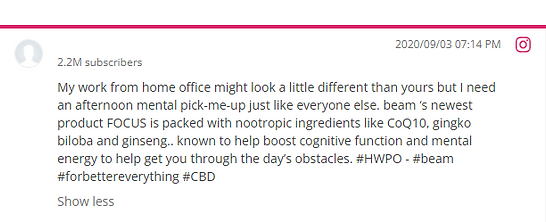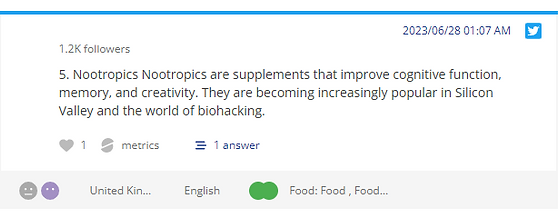Episode One: Mind Matters
The information age and so-called ‘permacrisis’ have left a lot of people feeling frazzled. High inflation, labor shortages, global conflict, climate change, and potential recession mean that nearly three quarters of UK adults now feel unable to cope. Meanwhile, a new survey of Americans finds that the majority are worn down by money worries. As marketers, we should not forget that audiences are under considerable pressure.
‘Frazzled’ has morphed into an identity. TikTok has reached over 30 million views for ‘frazzled English woman’ – with Twitter users weighing in to dissect its meaning.
One consequence has been increased attention to matters of the mind. Recent research by Huxly’s parent company MMR found that brain health is now the world’s second biggest health priority, pipped only by heart health and comfortably ahead of immune health. For highly competitive Generation Z, brain health takes pole position.
For this first episode of Like It Is, we deployed our tech to monitor conversations around brain health, including posts made by so-called influencers. The mission was to capture the rational and emotional dimensions of consumer sentiment, highlight key topics of conversation and consider ways in which brands might choose to respond.
The big news is that social mentions of brain health have now surpassed posts relating to heart health. In fact, total cognitive related conversations have surged by 195% over the past year alone. For anyone doubting the importance of mental health issues in 2023, think again.
Analysis of language reveals that ‘mind matters’, ‘brain care’, ‘mental health’, ‘neuro health’ (particularly among younger audiences) and references to ‘brain food’ are common rational phraseology.
Sentiment analysis reveals fear to be the overriding emotion surrounding brain health. People are genuinely concerned about the impact that daily life is having.
Many posts reflect the trend towards more holistic attitudes in the wellness space. We found numerous examples of people linking mental health with physical health, like this post from an influencer
.png)
To understand the maany facets of brain health, we analysed social conversations right back to the beginning of the pandemic. This exercise revealed five key themes – listed below with growth figures.

Data shoes that conversations around focus and performance have most momentum. Sub-topics include posts about mental clarity, concentration, and endurance. Prominent social hashtags in this space include #selfcare #mentalheath #fitness #nutrition and #wellness.
If you’re keen on drilling into any of these areas, book a FREE Social Call with the Like It Is team, and we’ll set up a call on Microsoft Teams.
It’s clear that all facets of brain health are experiencing strong momentum and are likely to continue to grow – even accelerate – as economic circumstances continue to weigh down. Meanwhile, some experts are warning that the rise in hybrid working is creating a ticking time bomb in respect of employees mental health.
This next post, with a potential audience of 25,000, suggests that we might invest in a skipping rope to boost our brain power…

Taking Control
With the world feeling like it’s against them, it’s not surprising that so many people are finding ways to win back control. Consider the growth of no & low alcohol, functional snacks, and private label as further proof that consumers are looking to ‘get a grip’ on health and finances.
Significantly, we found a 262% increase in mentions of ‘control’ in the brain health space over the last 12 months – reflecting a reported rise of a more intentional shopper.
If you’re keen on drilling into any of these areas, book a FREE Social Call with the Like It Is team, and we’ll set up a call on Microsoft Teams.
Conversations around nootropics, a classification of ingredients linked to cognitive support, have surged massively since the pandemic, and rose by another 16% in the last 12 months.
Although use of the term nootropics is currently confined to the edges of categories, we’ve seen some major multinationals start to dip their toes in the water, like PepsiCo sponsored Soulboost, and its inclusion of L-Theanine and Panax Ginseng.
One influencer with a cool 2.2million followers shamelessly plugs beam’s nootropics supplements to get them through an afternoon slump…

Another social poster trumpets the possible anti-inflammatory effects on the brain of CDP Choline – an ingredient that’s classified as a nootropic…

And this influencer writes how nootropics are all the buzz down Silicon Valley way – which could persuade some of the 1.2million followers to follow suit...

Gut-Brain Axis
Our second area reflecting people’s increasing need for control centers on the gut-brain axis. Emerging science finds that by altering the types of bacteria in our gut, it may be possible to improve our brain health.
Our vibe checking tech found conversations around the gut-brain axis to be accelerating by over 50% in the last 12 months.
This next post reflects a growing understanding of the link between gut health and mental state – and references inflammation. For context, a recent MMR health study found that ‘anti-inflammatory’ is a highly motivating claim for mainstream consumers.

Meanwhile, this post references fermented foods as a key support for balancing the gut-brain axis…

Another influencer chooses to reference mood food as a way to express the benefits of supporting the gut-brain axis, singling out GABA as a key ingredient…


Biohacking
Our third and final strand plays right into the heart of control. Biohacking has been quietly infiltrating popular culture for some time and also appears to be picking up momentum. Social mentions are up an impressive 43% in the last 12 months.
Defined as a form of biological experimentation done to improve human qualities or capabilities, many bio hacks are supported by scientific evidence - like intermittent fasting. Credible bio hacks for boosting memory and cognitive performance include ingesting Omega 3 fish oils, exercising regularly, doing puzzles, and getting 7-8 hours’ sleep each night.
To make the point comprehensively, one Reddit contributor offers a comprehensive daily hack routine, below…

Post-mortem
It’s clear that frazzled consumers are increasingly adopting strategies to support their brain health. Our vibe check has uncovered five main genres and a set of growth figures that brand managers really cannot ignore.
Some questions that companies should ponder include:
- Can my brand do more to reduce shoppers cognitive load at shelf – making it easier to buy?
- Can my brand develop claims that sit well with those seeking bio hacks?
- Is it time to promote nootropics front of pack?
Here we see that Focus & Performance commands most momentum, topping the charts since March 2020 and over the last 12 months. This genre covers conversations around mental clarity, concentration, and endurance. If you’re innovating to support people’s cognitive health and performance, book a FREE Social Call with the Like It Is team to access our social listening tool and build your plans!
NEXT UP ON 'LIKE IT IS' we will reveal how people are talking about the recent news that the World Health Organisation is to classify aspartame as 'potentially carcinogenic.'































